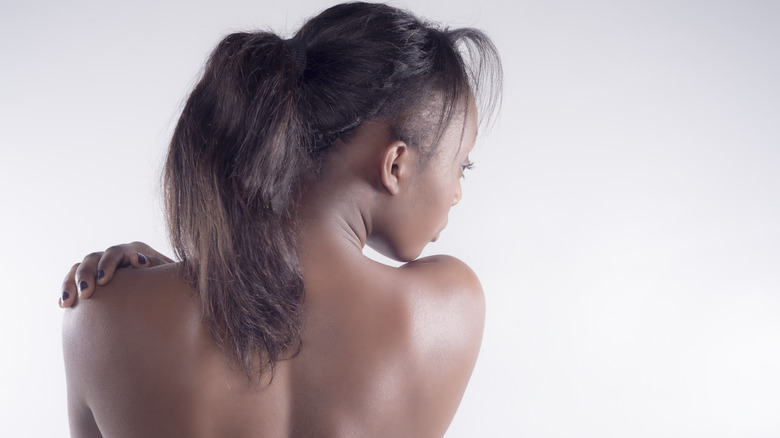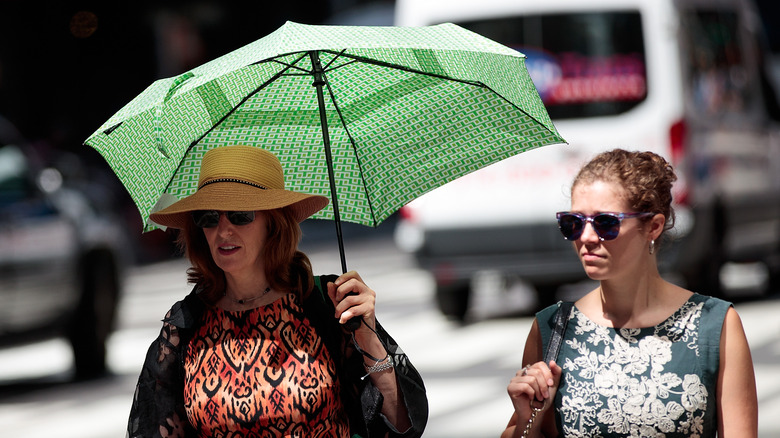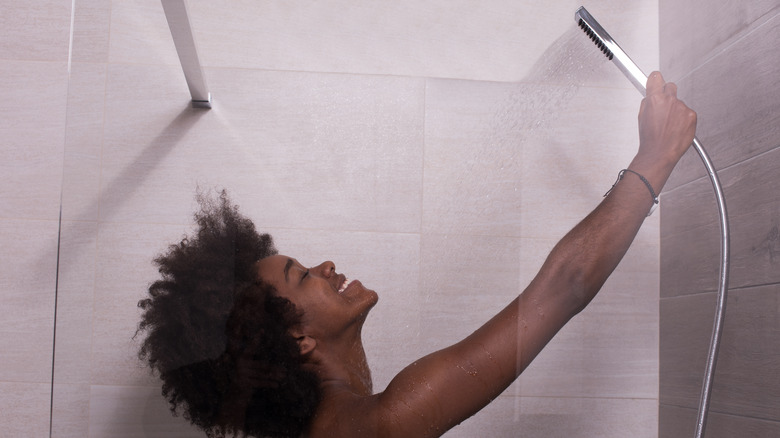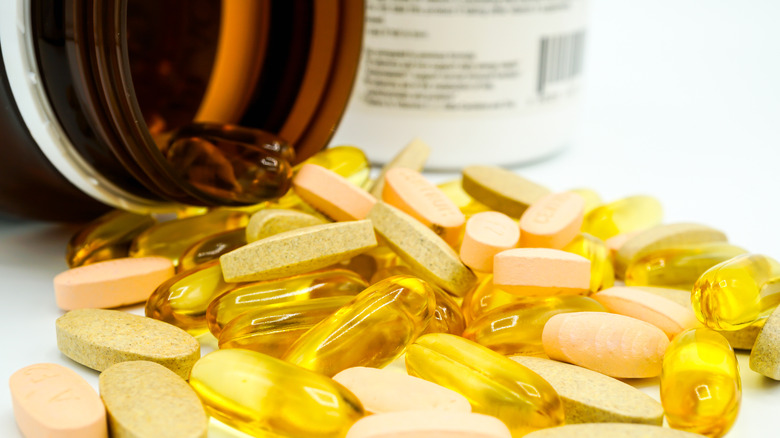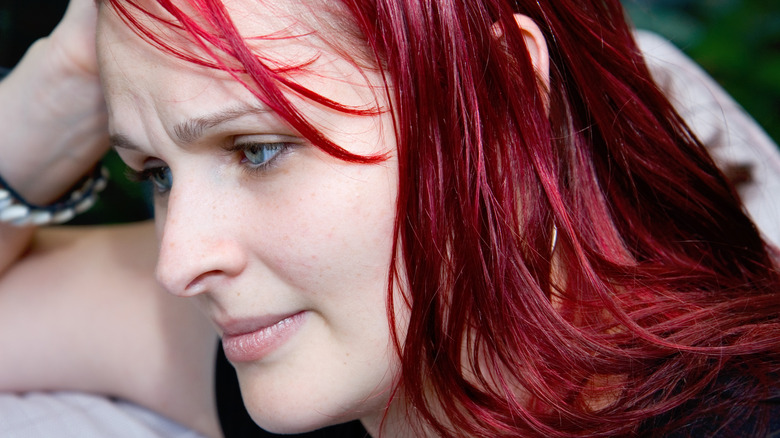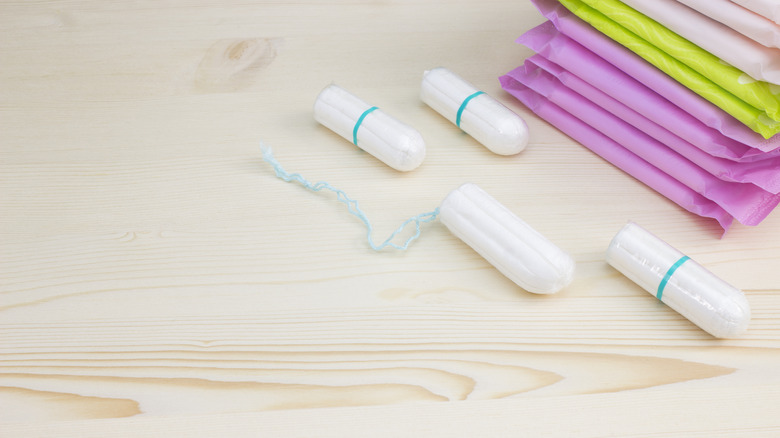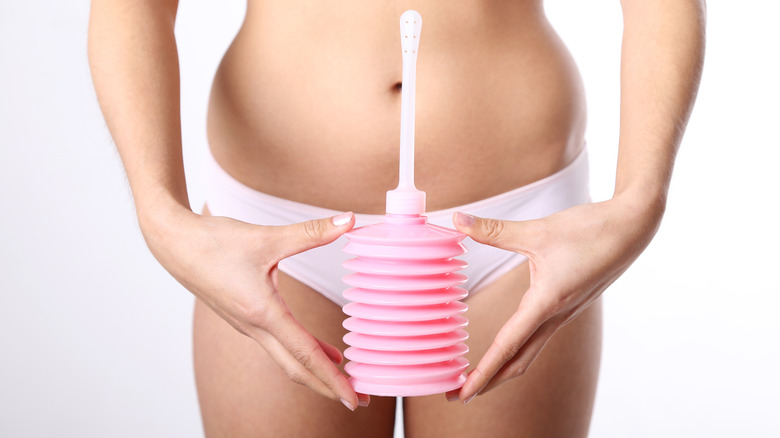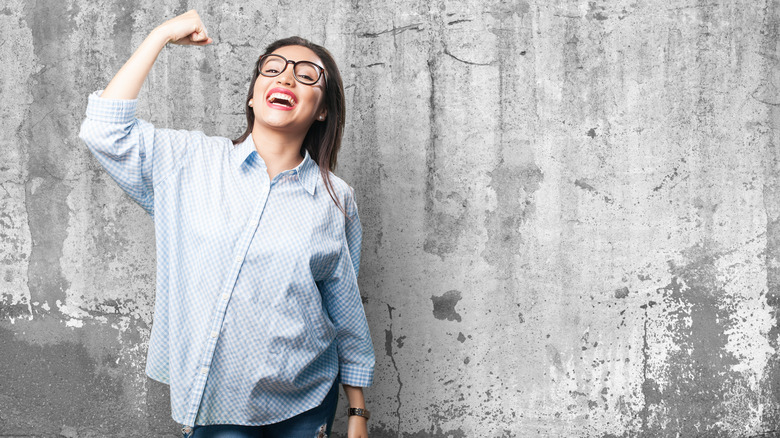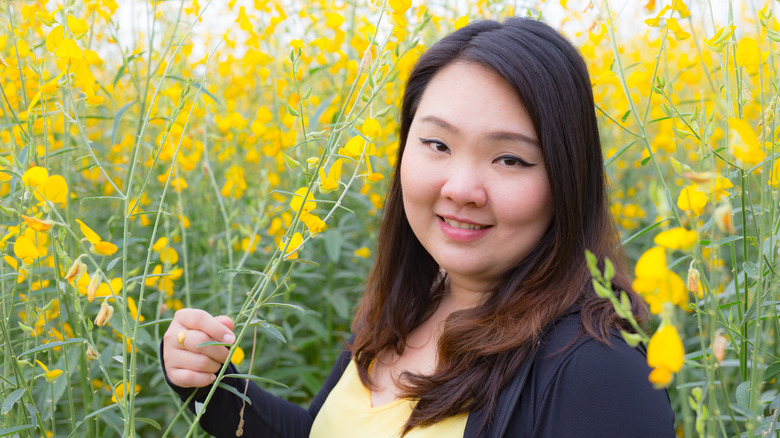Things Most Women Don't Know About Their Own Bodies
We may receive a commission on purchases made from links.
If you inhabit a woman's body, you're likely aware of how complex and multi-faceted it can be. No woman's body is identical to another's; we can be fat or thin, trans or cis, tall or short, abled or disabled. Some of us opt to get pregnant, give birth, and nurse, while others of us opt out of motherhood altogether. There's no shortage of diversity among us.
In spite of all of or variances, there are a few common facts about our own bodies that aren't aware of. So, I spoke to a variety of experts, and here is a list of things a lot of women don't know about our own bodies.
The sun's not your friend
A lot of women look forward to summer, when we can shed our long sleeves and boots in favor of sundresses and sandals. In many places it's also beach season, so it's the perfect time to relax on the sand with a book and a beverage. But all of that sun exposure can be bad for you skin — maybe even worse than you think. For one, it can age you. Dr. Kathy Taghipour, a dermatologist at Savana Urban Spa, told me, "Around 80% of women's wrinkles are caused by excessive sun exposure. Many people don't even think about the sun and the damage that it does on our skin." And it can be a lot more harmful than superficial aging. She continued, "When you get a sunburn, it's not your skin cells being damaged by the sun or dying. it's your skin cells' DNA being damaged and killing themselves so they don't turn into cancer." That's downright scary when you think about it!
The best ways to prevent premature ageing and sunburns are to always wear sunscreen when you go outdoors, limit your direct sun exposure, check your local UV index, and wear protective clothing. So you can still enjoy those lazy days at the beach, as long as you take the right precautions.
You skin dehydrates easily
For many women, hot baths and showers are an essential part of their self-care regimen — just check out the huge market for bath bombs and products. It makes sense given how relaxing and calming it is to soak sore muscles, enjoy solitude, and restore emotional calm. But like all good things, it's possible to indulge too much and end up dealing with some consequences.
For one, all of that soaking can be bad for your skin. Dr. Taghipour told me, "Taking long, hot showers is actually bad for your skin — hot water softens the oils in your skin so that they are easily washed away, thus making it easier for your skin to dry out or become itchy." That's certainly not what we want after bathing.
And you can have dry skin without even knowing it. Dr. Sonam Yadav, the Medical Director of Juverne, told me, "Most women with oily skin do not know that their skin can be severely dehydrated even while resembling an oil rig — and that over-cleansing or not hydrating can actually worsen this problem and cause rebound acne." So how do you make sure you don't overdo it? Limit the amount of time you spend in hot water, for one, and check in with your dermatologist; she may have advice as to which soaps and products are best for your unique skin.
We need specific nutrients
No two women have identical nutritional needs, but we do have many in common. Dr. Arielle Levitan, co-author of The Vitamin Solution: Two Doctors Clear the Confusion about Vitamins and Your Health and co-founder of Vous Vitamin, told me, "Most women don't know that they are in need of certain nutrients. Vitamin D, for example is a vitamin that is found mainly in sunlight and not in many food sources in significant amounts. Most of us are deficient in it if we are not taking it." That's why even though we previously told you to limit your sun exposure, it's just as important to make sure you get direct sunlight in safe quantities (confusing, we know!). If you're unsure if you're getting enough vitamin D, check with your doctor to see if she recommends a supplement.
Another common issue women face is an iron deficiency. Dr. Levitan noted that, "Most women also do not realize they are deficient in iron. They have lost iron through years of period and/or pregnancies and rarely consume enough red meat to make up for it, so total body iron stores are low. These deficiencies, among others, can lead to subtle symptoms such as fatigue, low energy, thinning hair, migraines and muscle aches." So if you notice any of these symptoms, it's possible you're not getting enough iron in your diet. Look into foods that are iron-rich, and consider adding them to your diet.
Finally, it can be beneficial to take a multi-vitamin tailored for women, as well as a calcium supplement for healthy bones.
We're prone to anxiety
Did you know women are twice as likely as men to develop an anxiety disorder? It sounds like a high number, but it's true — and there are scientific reasons why. Kimberly Hershenson, an NYC-based therapist, told me, "Women are more likely to feel anxiety because they have naturally higher levels of progesterone, cortisol and estradiol. This is why women are more intuitive regarding predicting threats and dangers." And for many women, these disorders can cause disruptions in our day-to-day lives, creating additional problems on top of what worries us initially.
So what are some best practices to deal with this anxiety? Hershenson has some recommendations. "Make a daily gratitude list before bed by writing down ten things you are grateful for." She also recommends that you start a meditation practice, even if it's only for five minutes a day. And finally, "Practice acceptance. Make a list of what you can control in the situation causing you anxiety (your reaction) and what you can't control (others' behavior)." And if these are not enough, check in with your doctor or medical professional. You're not alone!
About menstruation
Just as not all women have vulvas, not all women menstruate — either because they've gone through menopause, they're transgender, they're on certain kinds of birth control, or because of other reasons. Most women, however, have had a period at some point in their lives, but just because we experience it, doesn't mean we have all of the facts right. Noni Ayana, a sex educator and principal consultant of E.R.I.S. Consulting frequently has to address this with clients. "I've had to explain that menstruation is not necessarily a 'cleansing' as some would think is, similar to a sort of detox, and that the menstrual cycle is not exclusive to the time your period begins and ends; it is a 28 day (or so) process," she told me. Women can easily forget that it's a cycle, and not just a matter of bleeding and not bleeding.
Also, Ayana notes that it can be surprising when you learn how much your reproductive process has an impact on your body. She continued, "Women are often shocked when I describe how the female body is continuously and systematically preparing for a potential pregnancy." It's pretty crazy when you think about it.
Vaginas aren't unclean
Historically, women around the world have been taught that their bodies are unclean — during menstruation especially. And while many societies have become more educated about basic biology, it's tough to shake off thousands of years of stigma no matter where you live, and the U.S. is no different.
So it's no surprise that many women still believe that their vaginas are unclean. Noni Ayana told me, "Many women refuse to believe the vagina cleanses itself. When educating women, medical professionals often use the 'self-cleaning oven' analogy." So even though it's completely untrue that vaginas are somehow dirty, that fact alone is not enough to deter women from taking unnecessary steps in the name of hygiene. Ayana continued, "Women regularly use retail feminine hygiene products with the intention of cleaning their vagina, which is often socially viewed as inherently dirty. Unless there are possible signs of infection, allow the body to do what it's designed to do."
And if you douche? One study showed that you're twice as likely to get ovarian cancer. It's just not worth the risk.
We're stronger than we think
Women are often stereotyped to be fragile and delicate, unable to open jars on our own or change a tire. However, the myth of the weak woman is just that — a myth — and more and more women are cultivating active, healthy, and strong lifestyles. Sofia Sanchez, a registered dietitian and sports nutritionist told me, "Women are physically stronger than they think. In my line of work, I've seen athletes lift 200, 300 pounds — heavier weight than some men! I think the landscape is really changing here and society is embracing women's health and strength over appearance, and that's great!"
And even if you do work out, no amount of strength training is going to make you "bulk up" or look more masculine. Rather, it will help you become more toned and tightened. Plus, it's just good for you, as long as you're doing it correctly. And if you don't lift, you should start as it helps you retain muscle as you age, supports your joints, lowers anxiety, improves your mood, and more. So give it a shot — chances are you're stronger than you think.
Know yourself
While it certainly isn't easy being a woman, it's always an adventure. We're constantly changing and the best response is to continually develop rather than stagnate, mired in bad habits. And we learn more and more about ourselves every day, be it about our bodies, minds, or one another. So take everything that you have cumulatively learned and make sure that you're taking care of yourself as best you can. You've only get one body, after all!

